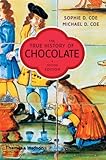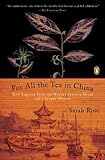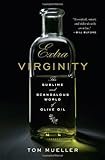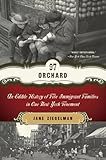I love reading about food. It is interesting to learn how certain food items are entwined with history and impacted world events as well as how they became so important to culture as well as our diet. We are what we eat, right? Here is a collection of books about food that I’ve put on my tbr pile:
 One of my friends has described this book as one of the best she’s ever read. Salt: A World History by Mark Kurlansky is a story about the history and importance of salt. From Goodreads:
One of my friends has described this book as one of the best she’s ever read. Salt: A World History by Mark Kurlansky is a story about the history and importance of salt. From Goodreads:
Kurlansky “turns his attention to a common household item with a long and intriguing history: salt. The only rock we eat, salt has shaped civilization from the very beginning, and its story is a glittering, often surprising part of the history of humankind. A substance so valuable it served as currency, salt has influenced the establishment of trade routes and cities, provoked and financed wars, secured empires, and inspired revolutions. Populated by colorful characters and filled with an unending series of fascinating details, Kurlansky’s kaleidoscopic history is a supremely entertaining, multi-layered masterpiece.”
 I actually have The True History of Chocolate by Sophie D. Coe and Michael D. Coe on my shelf right now. I looove chocolate. Who doesn’t? Goodreads says,
I actually have The True History of Chocolate by Sophie D. Coe and Michael D. Coe on my shelf right now. I looove chocolate. Who doesn’t? Goodreads says,
This delightful and best-selling tale of one of the world’s favorite foods draws upon botany, archaeology, and culinary history to present a complete and accurate history of chocolate. The story begins some 3,000 years ago in the jungles of Mexico and Central America with the chocolate tree, Theobroma Cacao, and the complex processes necessary to transform its bitter seeds into what is now known as chocolate. This was centuries before chocolate was consumed in generally unsweetened liquid form and used as currency by the Maya, and the Aztecs after them. The Spanish conquest of Central America introduced chocolate to Europe, where it first became the drink of kings and aristocrats and then was popularized in coffeehouses. Industrialization in the nineteenth and twentieth centuries made chocolate a food for the masses, and now, in our own time, it has become once again a luxury item. The second edition draws on recent research and genetic analysis to update the information on the origins of the chocolate tree and early use by the Maya and others, and there is a new section on the medical and nutritional benefits of chocolate.
 For All the Tea in China by Sarah Rose is currently on my Kindle. I love tea. I love teapots. I love everything about a traditional British tea. This book, however, makes the story of tea sound like an adventure. Goodreads describes the book:
For All the Tea in China by Sarah Rose is currently on my Kindle. I love tea. I love teapots. I love everything about a traditional British tea. This book, however, makes the story of tea sound like an adventure. Goodreads describes the book:
Robert Fortune was a Scottish gardener, botanist, plant hunter—and industrial spy. In 1848, the East India Company engaged him to make a clandestine trip into the interior of China—territory forbidden to foreigners—to steal the closely guarded secrets of tea. For centuries, China had been the world’s sole tea manufacturer. Britain purchased this fuel for its Empire by trading opium to the Chinese—a poisonous relationship Britain fought two destructive wars to sustain. The East India Company had profited lavishly as the middleman, but now it was sinking, having lost its monopoly to trade tea. Its salvation, it thought, was to establish its own plantations in the Himalayas of British India. There were just two problems: India had no tea plants worth growing, and the company wouldn’t have known what to do with them if it had. Hence Robert Fortune’s daring trip. The Chinese interior was off-limits and virtually unknown to the West, but that’s where the finest tea was grown—the richest oolongs, soochongs and pekoes. And the Emperor aimed to keep it that way.
 I was doing some research on olive oil the other day, and I came across Extra Virginity: The Sublime and Scandalous World of Olive Oil by Tom Mueller, and I have to admit I was intrigued. A whole book in olive oil? Apparently so:
I was doing some research on olive oil the other day, and I came across Extra Virginity: The Sublime and Scandalous World of Olive Oil by Tom Mueller, and I have to admit I was intrigued. A whole book in olive oil? Apparently so:
For millennia, fresh olive oil has been one of life’s necessities—not just as food but also as medicine, a beauty aid, and a vital element of religious ritual. Today’s researchers are continuing to confirm the remarkable, life-giving properties of true extra-virgin, and “extra-virgin Italian” has become the highest standard of quality.
But what if this symbol of purity has become deeply corrupt? Starting with an explosive article in The New Yorker, Tom Mueller has become the world’s expert on olive oil and olive oil fraud-a story of globalization, deception, and crime in the food industry from ancient times to the present, and a powerful indictment of today’s lax protections against fake and even toxic food products in the United States. A rich and deliciously readable narrative, Extra Virginity is also an inspiring account of the artisanal producers, chemical analysts, chefs, and food activists who are defending the extraordinary oils that truly deserve the name “extra-virgin.”
 97 Orchard: An Edible History of Five Immigrant Families in One New York Tenement by Jane Ziegelman has been on my list for a long time. Goodreads says,
97 Orchard: An Edible History of Five Immigrant Families in One New York Tenement by Jane Ziegelman has been on my list for a long time. Goodreads says,
This delicious saga of how immigrant food became American food follows European immigrants on a remarkable journey from the Ellis Island dining hall to tiny tenement kitchens, from Lower East Side pushcart markets and delicatessens out into the wider world of American cuisine.
Although reviewers have mentioned the book isn’t really about the immigrant families so much as it is about the kinds of food immigrants brought to America and that the single tenement was more an organization device than anything else, I still really want to read it. Just reading the description from Publisher’s Weekly makes me hungry:
Ziegelman puts a historical spin to the notion that you are what you eat by looking at five immigrant families from what she calls the “elemental perspective of the foods they ate.” They are German, Italian, Irish, and Jewish (both Orthodox and Reform) from Russia and Germany—they are new Americans, and each family, sometime between 1863 and 1935, lived on Manhattan’s Lower East Side. Each represents the predicaments faced in adapting the food traditions it knew to the country it adopted. From census data, newspaper accounts, sociological studies, and cookbooks of the time, Ziegelman vividly renders a proud, diverse community learning to be American. She describes the funk of fermenting sauerkraut, the bounty of a pushcart market, the culinary versatility of a potato, as well as such treats as hamburger, spaghetti, and lager beer. Beyond the foodstuffs and recipes of the time, however, are the mores, histories, and identities that food evokes. Through food, the author records the immigrants’ struggle to reinterpret themselves in an American context and their reciprocal impact on American culture at large.
Food is one of those things that shapes our culture in so many ways. We also derive so much of who we are from the food we eat. I was listening to an Italian-American colleague at work the other day telling a co-worker he never had macaroni and cheese as a child because it was “boxed pasta,” and his mother wouldn’t have it in the house. I don’t think I ever had pasta that wasn’t from a box unless it was at a restaurant. I know folks who swear by homemade pasta and spend the time to make it, but would I know the difference? I don’t know what I’m missing. Chances are pretty good, however, that my colleague doesn’t know good Southern fried chicken.
So, do you have any good books about food? Please share.